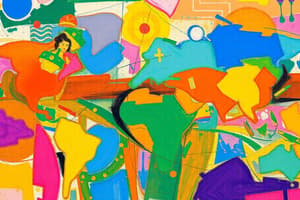Podcast
Questions and Answers
What did the humanists study during the Renaissance period?
What did the humanists study during the Renaissance period?
- A variety of subjects including literature, drama, philosophy, and history (correct)
- Hebrew and the Bible only
- Greek and Latin texts only
- Architecture and engineering principles
What distinguished Rome from Venice and Florence during the Renaissance?
What distinguished Rome from Venice and Florence during the Renaissance?
- Economic growth and political stability
- Shared power between civilian and Church leaders (correct)
- Artistic innovations
- Dominance of the Medici family
Which Renaissance artist completed the famous works 'The Last Supper' and the 'Mona Lisa'?
Which Renaissance artist completed the famous works 'The Last Supper' and the 'Mona Lisa'?
- Leonardo da Vinci (correct)
- Raphael
- Michelangelo
- Donatello
What did Machiavelli believe was the best form of government during the Renaissance?
What did Machiavelli believe was the best form of government during the Renaissance?
How did the printing press impact society during the Renaissance?
How did the printing press impact society during the Renaissance?
Which family dominated politics in Florence for decades during the Renaissance?
Which family dominated politics in Florence for decades during the Renaissance?
What is the definition of optics?
What is the definition of optics?
What was the role of monasteries in preserving knowledge after the fall of the Roman Empire?
What was the role of monasteries in preserving knowledge after the fall of the Roman Empire?
Which scholars' works helped Europeans acquire the learning of the ancient Greeks?
Which scholars' works helped Europeans acquire the learning of the ancient Greeks?
What did universities contribute to the development of the Renaissance?
What did universities contribute to the development of the Renaissance?
What was Venice governed by?
What was Venice governed by?
What is the definition of indulgence in the context provided?
What is the definition of indulgence in the context provided?
Flashcards are hidden until you start studying
Study Notes
Florentine Government
- Florence was governed by a committee of priors, chosen by lot and serving for only two months at a time.
Comparison of Rome, Venice, and Florence
- Rome was different from Venice and Florence because its civilian leaders had to share power with Church leaders and it became poorer and smaller while the other two cities grew bigger and richer.
Humanism
- Humanists studied Greek and Latin texts in various subject areas, including literature, drama, philosophy, and history.
- They also studied Hebrew and the Bible.
Renaissance Architecture and Art
- Renaissance architectural styles adapted ancient Roman building styles to the modern world.
- Renaissance art looked realistic and imitated nature, using perspective to make paintings look three-dimensional.
The Medici Family
- The Medici family dominated politics in Florence for decades.
- Cosimo de’ Medici was the wealthiest and most powerful man in Florence, funding a library and the building of churches.
- His grandson Lorenzo was a patron of many great thinkers and artists, including Leonardo da Vinci.
Famous Artists and Thinkers
- Leonardo da Vinci completed the Last Supper and the Mona Lisa, and kept notebooks with sketches of his inventions and paintings.
- Michelangelo completed the Pietà, the David, and the ceiling of the Sistine Chapel.
- Machiavelli believed that republics were the best form of government and that a ruthless leader was the quickest way to bring about change and ensure a state's survival.
Renaissance in Rome
- During the 1400s CE, Rome was reconstructed and became a Renaissance city.
- The pope moved to St. Peter's Basilica and built the Sistine Chapel, and also built a new bridge across the Tiber River.
- Artists discovered ancient statues and paintings.
The Printing Press and Its Impact
- The printing press led to the creation of a new print business and an annual book fair in Frankfurt.
- It gave more people access to the written word and enabled writers to profit from book sales.
- It also led to the beginning of legal protections called privileges, which are the ancestors of modern copyright.
Key Terms
- Optics: the science that deals with light and images.
- Theology: the study of religious faith, practice, and experience.
- Credit: a system of buying now and paying later.
- Perspective: a technique used to make something that is flat appear to have depth, in addition to height and width.
- Indulgence: the removal or reduction of certain punishments for sin, linked to a special act of penance.
- Penance: an act, such as praying, done to show regret over some wrongdoing.
- Purge: removal from a group or place in a sudden or violent way.
- Censor: to remove or prohibit books, art, films, or other media that the government finds offensive, immoral, or harmful.
Historical Context
- After the fall of the Roman Empire, the empire's government and education system fell apart.
- Western Europe fell out of contact with the Eastern Roman Empire, and knowledge of the Greek language faded.
- Monasteries preserved some of the knowledge of ancient Rome by copying books in Latin, especially Christian texts and works of Latin philosophy.
Intellectual Contributions
- Europeans acquired the learning of the ancient Greeks from the works of Muslim scholars.
- They acquired knowledge of mathematics, astronomy, medicine, and other subjects from the works of Ibn al-Haytham, Ibn Sina, and Ibn Rushd.
- Universities contributed to the development of the Renaissance by creating a standard education across Europe and serving as centers of learning.
- Italy became the wealthiest region of Europe through trade.
- Venice was governed by a doge, who was elected by the city's elite and ruled for life.
Studying That Suits You
Use AI to generate personalized quizzes and flashcards to suit your learning preferences.



